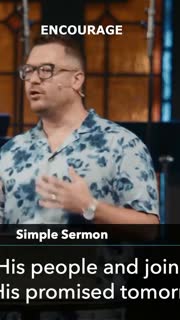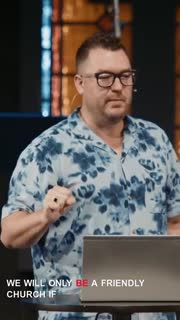Rebuilding Priorities: God's Call to Community Faithfulness
Devotional
Sermon Summary
Bible Study Guide
Sermon Clips
### Quotes for Outreach
1. "The good news is the people respond really well. They stop what they're doing, and they all begin to build the house of the Lord together. And God is pleased." [19:38] (7 seconds)
2. "God is with his people during the hardships. That is one of the big distinctions that Christianity fights, is God doesn't promise to take us out of the struggles. God promises to be with us through the struggles." [43:42] (12 seconds)
3. "I want to encourage you to prioritize God and his people and join him today in building his promise tomorrow. Prioritize God and his people. And so I want you to put God first in your life because I believe that that is what is best for you." [45:09] (19 seconds)
4. "No matter what hardship you are facing right now, no matter how bad your family is right now, no matter how hard your health situation is right now, you are not alone and there is a brighter, better promised future. And you can hold on to that because God keeps his promises." [44:21] (15 seconds)
### Quotes for Members
1. "Haggai is supposed to be interpreted and obeyed inside an entire society. He wasn't talking to individuals per se. He was talking to people. He was talking to the society, which is made up of individuals, but they're not their own people. They are part of the society." [30:10] (11 seconds)
2. "What if viewing spirituality exclusively as an individual exercise is somewhere between incomplete and inaccurate? These are questions I'm wrestling with all week as I've been looking at this." [34:09] (13 seconds)
3. "One of the challenges from Haggai that is applicable today is to remember that the obedience of God's people is one of the ways that God has chosen to accomplish his work and advance his kingdom in his world." [40:47] (13 seconds)
4. "We will only be a friendly church if every person that's sitting here and hearing me is friendly to the person next to them, and especially the one they don't recognize. We will only be a generous church if each person here gives of their time and their talents and their money." [42:23] (13 seconds)
5. "In a communal society, you are a part of the whole. You are defined by your relationships. You have a shared identity and unity and you have a collective responsibility. You work for the betterment of the whole community and each person taking care of each other and expecting them to do the same." [28:47] (18 seconds)
Ask a question about this sermon
1. "The good news is the people respond really well. They stop what they're doing, and they all begin to build the house of the Lord together. And God is pleased." [19:38] (7 seconds)
2. "God is with his people during the hardships. That is one of the big distinctions that Christianity fights, is God doesn't promise to take us out of the struggles. God promises to be with us through the struggles." [43:42] (12 seconds)
3. "I want to encourage you to prioritize God and his people and join him today in building his promise tomorrow. Prioritize God and his people. And so I want you to put God first in your life because I believe that that is what is best for you." [45:09] (19 seconds)
4. "No matter what hardship you are facing right now, no matter how bad your family is right now, no matter how hard your health situation is right now, you are not alone and there is a brighter, better promised future. And you can hold on to that because God keeps his promises." [44:21] (15 seconds)
### Quotes for Members
1. "Haggai is supposed to be interpreted and obeyed inside an entire society. He wasn't talking to individuals per se. He was talking to people. He was talking to the society, which is made up of individuals, but they're not their own people. They are part of the society." [30:10] (11 seconds)
2. "What if viewing spirituality exclusively as an individual exercise is somewhere between incomplete and inaccurate? These are questions I'm wrestling with all week as I've been looking at this." [34:09] (13 seconds)
3. "One of the challenges from Haggai that is applicable today is to remember that the obedience of God's people is one of the ways that God has chosen to accomplish his work and advance his kingdom in his world." [40:47] (13 seconds)
4. "We will only be a friendly church if every person that's sitting here and hearing me is friendly to the person next to them, and especially the one they don't recognize. We will only be a generous church if each person here gives of their time and their talents and their money." [42:23] (13 seconds)
5. "In a communal society, you are a part of the whole. You are defined by your relationships. You have a shared identity and unity and you have a collective responsibility. You work for the betterment of the whole community and each person taking care of each other and expecting them to do the same." [28:47] (18 seconds)









